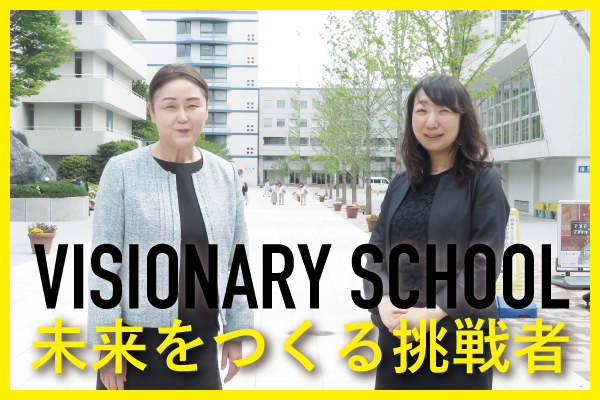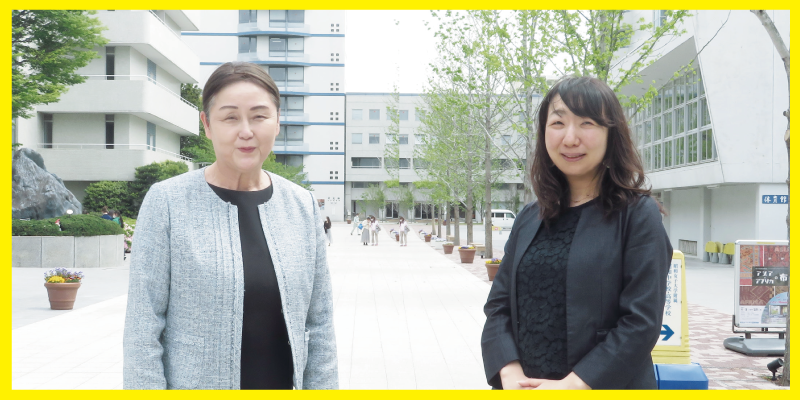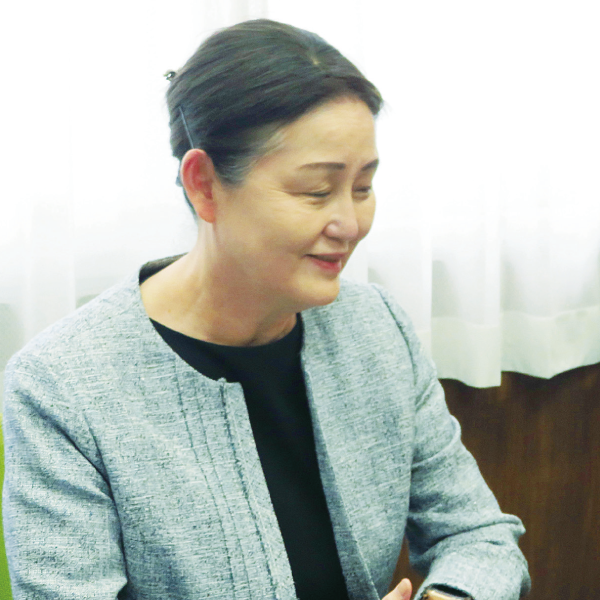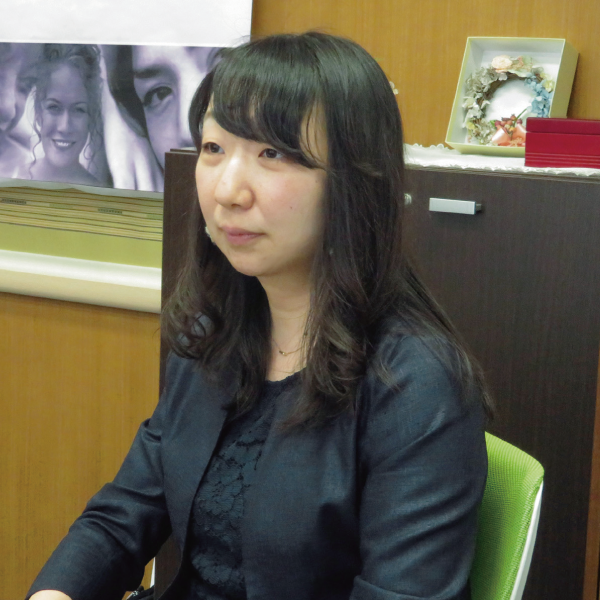- Visionary School
- Information for Teachers
Inspiring intellectual curiosity and nurturing women to become active members of society
2021.07.12

VISIONARY SCHOOL
Challengers who create the future
Showa Women's University Educational Corporation's school goal is "to be the light of the world. The school has been focusing on career education and global education, aiming to enable women to fully demonstrate their abilities and play an active role in society. Showa Junior and Senior High School attached to Showa Women's University started its own Super Science Course in the 2018 academic year.
A school that nurtures women as professionals
Nakajima :. From the perspective of Principal Mashimo, where do you see Showa Women's heading in the future?
Mashita :. The population of 18-year-olds will be drastically decreasing in the future, and we are sending out a message to them to study science, mathematics, and data science after considering what they will do then. We believe that no job, regardless of whether it is in the humanities or sciences, can be done without evidence, and that data utilization skills will be absolutely necessary for working people.
Nakajima :.We are shifting away from old-fashioned values such as "women are good for support.
Mashita :. Yes, I did. I myself graduated from an all-girls' school and university, and I was told to go out in front of the crowd. As the working population decreases, women will be working harder and harder in the future.
Nakajima :. So you nurture people who have the ability to be independent and do things on their own.
Mashita :. We also tell teachers not to say that because they are girls, they "don't have to push themselves" or that because they are girls, "this much is enough. Teachers need to do their job of developing the good qualities of the children as much as possible. Children have their own good qualities, but I think they look at the adults around them and control how much they let out.
Nakajima :. That's right. Once children are motivated to do something that we may think is a bit difficult, they go out and get the necessary information on their own, absorb it at an amazing speed, and act on it.
Mashita :. When I see this, I think that the job of schooling is to give students more opportunities.
A moment of awakening for each student.
Nakajima :. Is it your own experience that led you to think this way?
Mashita :. In my high school biology class, my teacher told us that the most important element in the mechanism of photosynthesis in plants is the sun, and I remember thinking, "Wow! I remember thinking, "Wow! Later, when I learned about development, I was moved by the mystery of life: how can one fertilized egg turn into something different and not return to its original state? I was moved by the mystery of life. It opened my eyes to the fact that biology is not just a subject to be memorized.
Nakajima :. A single cell divides progressively to make up a person's entire body and to maintain complex life functions. It is a wonder, isn't it?
Mashita :. Fascinated by its wonders, I chose to study biology in college.
Nakajima :. I, too, have a similar experience. One day, my high school homeroom teacher told me a story about blue roses. Roses originally do not have blue pigmentation, so they can never turn blue in natural crossings, but research is being conducted to produce blue roses using biotechnology, which was said to be impossible. I then went to the library and borrowed and read every book on biotechnology I could find, and then I started my research career. Until the day before I heard that story, I was thinking of becoming a public servant.
Mashita :. That would be difficult to reach on your own if there were no outside encouragement.
Nakajima :. Yes, it was. So for me it was a very emotional moment. But there are children who, when given the same stimulus, just think, "Hmmm, I see," and that's it. I guess you have to keep giving them that kind of opportunity.
Mashita :. I tell the children about the information I found interesting that I just purchased yesterday. I repeat that kind of thing.
Nakajima :. Some kids bite, and we can deepen their learning by giving them more information.
The nearest and closest presence to you
Mashita :. In this sense, I still believe that the most effective way to bring about change in children is for teachers in the field to enlist their students.
During the teacher interview, I ask 1-on-1 what the teacher is best at. Not simply how good they are at teaching a subject, but what they are originally good at, what they like to do, and what they are passionate about. That is a good teacher, and I think that is what makes a school strong.
Nakajima :. The same is true for the experimental classes at Libanes. If it is merely to input knowledge, we only need one instructor who can speak the best. Instead, we always try to have someone who knows the latest research speak from an original angle each time. Different instructors find different things interesting, so even if the subject matter of the experiments is the same, we will have different themed experimental classes. I think this way we can capture the interest of more students.
Mashita :. In schools, the teachers themselves are the same, but they try to insert topics in the introduction of their lessons. The repetition of this process attracts the interest of more students.
Nakajima :. It would be great if this triggers some students to get involved in science and research activities.
Mashita :. Yes, we do have a science program in place, but it is not enough. Our school practices a variety of science programs, but it is still not enough. For example, I think that even though we let students set their own themes, their research perspectives are often divergent.
Nakajima :. I see. I also look through more than 100 research themes for junior high and high school students every year, and I see a certain percentage of themes that lack specificity; I often hear about SDGs, etc. in the news, so you bring up grand themes on a global scale.
Mashita :. Then it is difficult to connect to research. It would be nice if I could first train myself in basic research concepts and skills. After that, I would like to try to find my original question.
Nakajima :. I feel that it is important for students to choose a subject that they like the most and are most interested in. When students like something, they naturally try to gather information, and researching is not difficult. As a result, there is more input.
Mashita :. Without input, ultimately nothing can be said.
Nakajima :. That's right. I believe that this deepens the thinking of the point of view. No matter how good the subject matter is as a research theme, we do not choose a theme that the student does not like. I try to let them know to some extent where their interests and concerns lie through experimental experiences before deciding on a theme that they will really work on.
Mashita :. Draw out the interests of children who are about to take the first step, organize them through dialogue, and reach out to them.
Nakajima :. And they need mentors who can give them momentum and accompany them.
Mashita :. It is absolutely necessary.
Creating a cycle of learning that transcends generations.
Mashita :. I once had a junior high school student try to organize the interests of affiliated elementary school and kindergarten students. Based on the experience of being mentored by university students and others, the next time I mentor the younger students, the system is designed to deepen their learning.
Nakajima :. The research support program for the next generation at LIVERNESS provides graduate student mentors to support their research. We have seen an increase in the number of students who have left the program after receiving mentoring as middle and high school students and are now supporting the program as mentors.
Mashita :. The value of mentors who are close in age is very significant, and SSH research reports have shown that mentors play a significant role.
Nakajima :. Mentors are the ones who are closest to the students and have the most conversations with them. Mentors transform students through their interactions with them. They are also close role models because they are close in age.
Mashita :. We need to create such a cycle.
Nakajima :. Showa Gakuen has everything from an accredited children's school to a graduate school. It will be an advantage to be able to circulate within the school.
Potential of Girls from Girls' Schools
Nakajima :. You are now in a position to convey your interest in biology, which was sparked by high school biology.
Mashita :. Yes, I have. At first, I was standing in the field and communicating my own interests to students, but then I realized that if I shared those methods with teachers, I could ultimately communicate my ideas to more children.
Nakajima :. As your position has changed since then, the scope of your activities has also expanded. What was the turning point for you?
Mashita :. When I was at Kawagoe Girls' High School, I started the SSH initiative in order to develop the potential of students. There, I witnessed the growth of science-related skills and the broadening of career choices for female students.
Nakajima :. Generally speaking, career choices are narrowed gradually through a process of elimination, but at that time it was the other way around, wasn't it?
Mashita :. Yes, we are. Showa Women's also has a new super science course starting in 2018, and we are looking forward to taking on even more new challenges in the future. This is already your fifth school for working at a girls' school.
Nakajima :. What do you think will happen to girls' schools in the future?
Mashita :. I believe that as long as there is a gender gap, a glass ceiling for women, or an awareness on the part of women that "who am I", there is a reason for the existence of girls' schools. I had a discussion with the principal of another girls' school, "Why is a girls' school better?" I feel that the possibilities for girls are greater in an all-girls school than in a co-ed school.
Nakajima :. We are increasing the number of various mechanisms for this purpose. What is the most recent initiative that you are particularly focusing on?
Mashita :. I am now trying to open source a programming curriculum. I hope to develop it into a system that will nurture girls' scientific skills, not just at my school. I would like to package it and make it available to everyone.
Nakajima :. That is very significant. By bringing in the wisdom of many different people, we can challenge ourselves to do things that we could not do in our own schools alone.
Mashita :. I believe that this will help raise the level of all of them, not just some of the top ones. I would like to work with many people to raise the children of Japan.

Mineko Mashita(Mashimo Mineko)
Principal, Showa Junior and Senior High School attached to Showa Women's University (concurrently Elementary School)
Graduated from Nara Women's University, Faculty of Science. Worked in science and biology education at a Saitama prefectural high school, and also worked at a boys' school. After working for the prefectural Board of Education and as a prefectural school vice principal and principal, he served as principal of Otsuma Arashiyama Junior and Senior High School until FY 2019, and has been in his current position since FY Kakui. This year, he also serves as the elementary school principal. Aiming to expand opportunities for women in particular to play an active role in society, she is working to promote STEAM education, including the selection of science-related careers for female students and the promotion of programming education.

Kaori Nakajima(Nakashima, Kaori)
Educational Development Division, LIVERNESS Co.
Director of NEST Lab., an institute for elementary and junior high school students
After working in the RIVANES Research and Development Division, he moved his seat to the Education Development Division in November 2018, where he will focus on fostering next-generation researchers and demonstrating the effectiveness of education through practical research activities. He is promoting the construction of a platform for discovering and fostering sustainable next-generation researchers, and is a senior mentor of the NEST Project, a project adopted by the JST Junior Doctor Training School.
